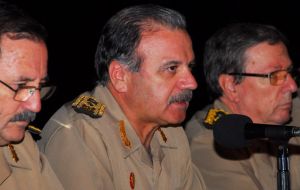MercoPress. South Atlantic News Agency
Uruguayan Army “will not tolerate or cover up” murderers within its ranks
 General Pedro Aguerre and other officers making the announcement
General Pedro Aguerre and other officers making the announcement The Uruguayan Army will not “accept, tolerate or cover up for” murderers and criminals within its ranks, said Commander General Pedro Aguerre speaking to the media about the discovery of the remains of teacher and journalist Julio Castro disappeared after being detained by soldiers in 1977.
The remains of Castro were found at a military compound in October and this week the Uruguayan government announced they had been identified following on DNA tests.
Uruguay was ruled by a military dictatorship from 1973 to 1984 and in that period thousands were arrested, imprisoned and some disappeared or their remains have never been found. Castro was one of them and the official version given to a Truth Commission created in 2001 was that the former teacher in his late sixties had died under torture.
The anthropologist and forensic reports on the remains of Castro effectively show he was tortured but also that he was finally executed with a shot in the head, which triggered an immediate reaction from the political system since they felt betrayed by the revelations from the military as to what really happened with some of the prisoners of the time.
General Aguerre at the press conference next to the current generation of generals was forced to say he had no knowledge of any pact of silence regarding the fate of Castro or other victims of the dictatorship.
“But if there were, or still is, such a pact, from this moment I am ordering an end to it,” said General Aguerre, who became army commander in October. He is the son a former Army officer who at the time was fired from the force for allegedly collaborating with the urban guerrillas that prevailed in Uruguay during the sixties and early seventies until the military coup.
Aguerre said he was requesting help from within and beyond the military sphere to obtain information about the Army's possible involvement in the case of Julio Castro and others.
Uruguayan President Jose Mujica (himself a former urban guerrilla leader) and several human rights organisations have repeatedly urged those who may have information about people who disappeared during military rule to come forward.
Military rule and the crimes committed under it remain a highly divisive issue in Uruguayan society.
The slow motion Uruguayan coup which started in 1972 when the opposition did not accept the national election results continued in February 1973 when the military insinuated the coup but of a left-wing brand immediately obtaining the support from part of the political system, communist unions, Socialist publications and left wing groups.
But in June 1973 when the military closed Parliament, banned unions and proscribed politicians for life, they went after all those who had expressed support for the February ‘test’. It was not until 1983 when the military accepted to hold talks for a return to democracy which took place with the 1984 elections.
However part of the non-written deal was a general amnesty for crimes committed by both sides: the urban guerrillas that took arms against democratically elected governments (most of them in jail or overseas) and the military and police officers involved in repression activities during the 1973/1984 period.
The newly elected parliament in 1985 only voted half the deal and opened the jails. The second inconclusive half was finally voted in 1986 in a law by which the Uruguayan state drops prosecution claims against military and police officers crimes committed during the period, with the exception of those involving children. The bill was twice ratified in 1989 and 2009 referendums sponsored by different governments.
However last October the ruling coalition lawmakers taking advantage of its majority voted to revoke the 1986 law ignoring the two referendums which under the Uruguayan legal system technically needs another referendum for it to be revoked.
Nevertheless the heated debate which preceded the vote lasted for 12 hours. Human rights groups feared the 30-year expiration of crimes under Uruguayan law, since the condition of crimes against humanity --and non prescriptable-- has only been applied on a case to case basis.




Top Comments
Disclaimer & comment rules-

-

Read all commentslet's listen if Pedro Aguerre tells us why the military coup was made .
Dec 06th, 2011 - 06:44 pm 0Julio Castro had absolutly no relation with the guerrilla, he had no arms or was hiding anyone. he was a journalist, a teacher and a thinker. Those were the reasons why he was executed. A 68 years old school teacher, think about that.
Dec 07th, 2011 - 12:28 pm 0Commenting for this story is now closed.
If you have a Facebook account, become a fan and comment on our Facebook Page!